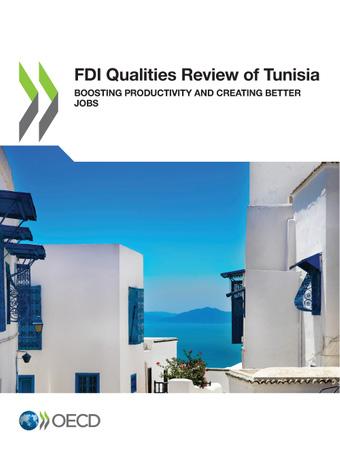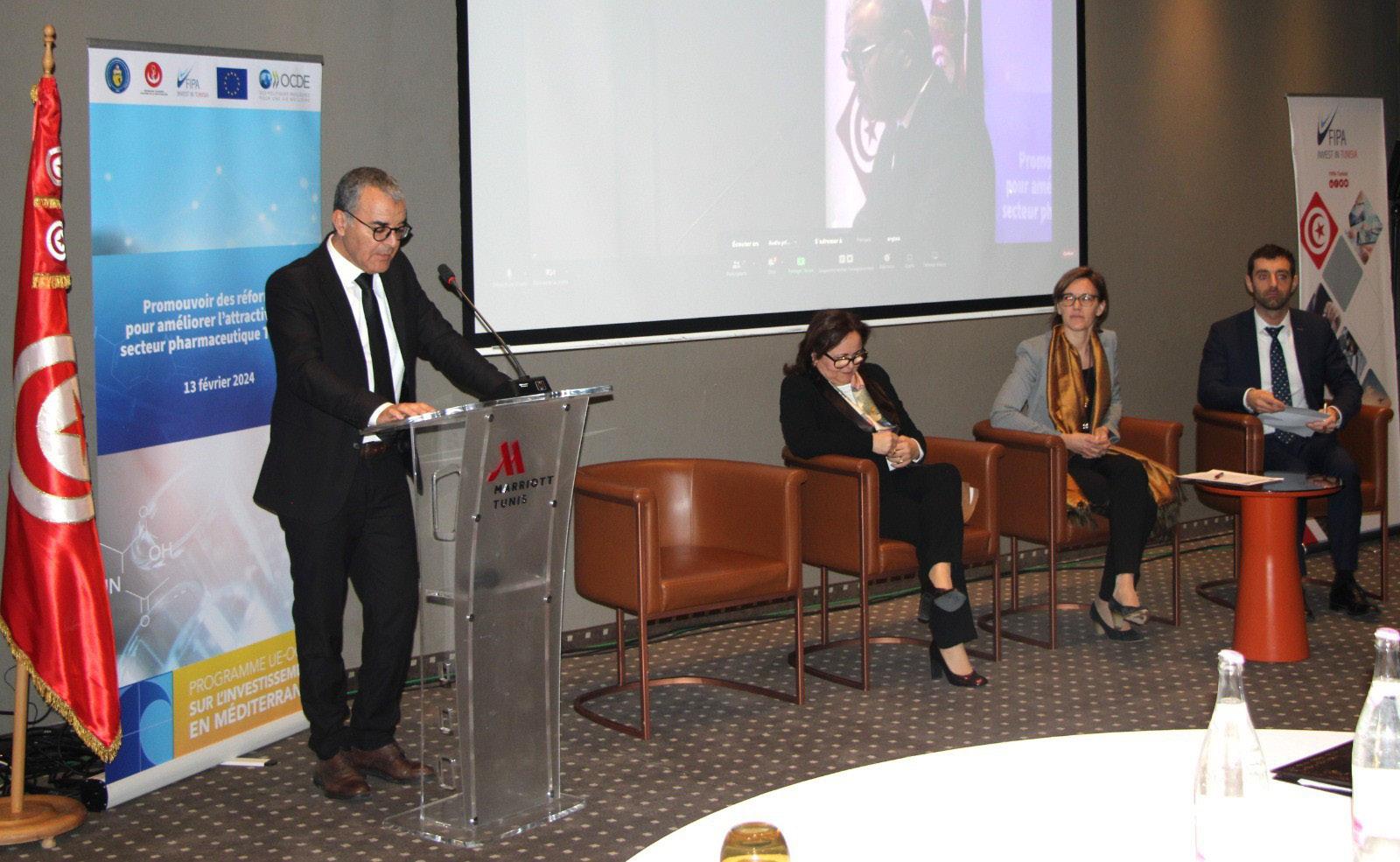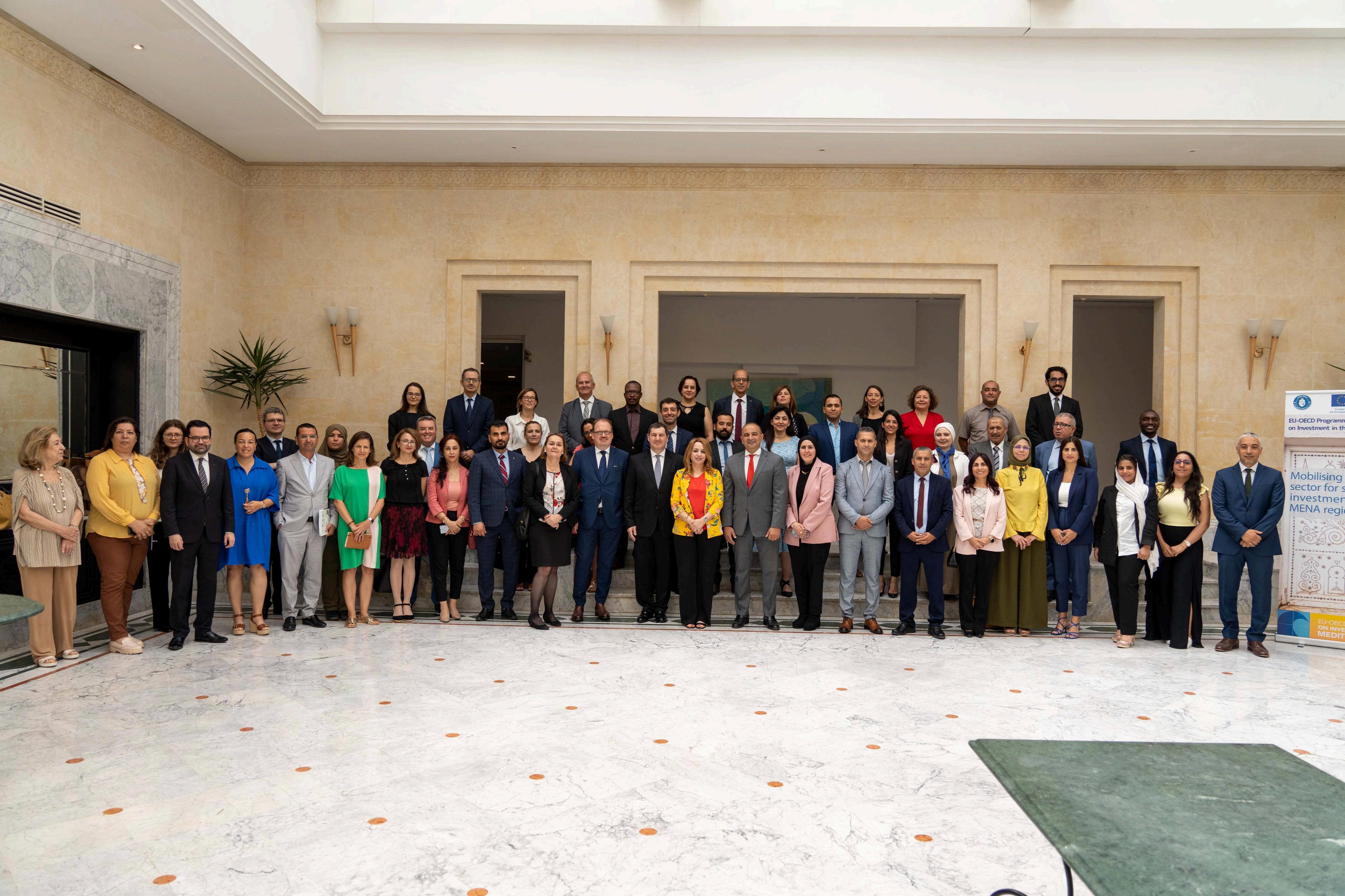



2020-2024






2020-2024

Mobilising private investment is key not only to spur competitiveness in the Southern Mediterranean, but also to support more broad-based economic growth across the region. Sustainable investments, both domestic and foreign, can advance key sustainable development goals, including job creation, productivity gains, skills development and green growth. Through the EU-OECD Programme on Investment in the Mediterranean, the OECD supported a wide range of reforms and policy initiatives to improve the investment climate and to materialise further the benefits of FDI.
The Programme has worked with governments and the private sector in Algeria, Egypt, Jordan, Lebanon, Libya, Morocco, the Palestinian Authority, and Tunisia to implement reforms to ensure that investment supports creation of quality jobs – particularly for youth and women – and brings new economic opportunities to the region.
targeted policy advice and capacity building on investment policy design and implementation
public-private dialogues on investment climate reforms in priority sectors
monitoring and evaluation of reforms to gauge success
Stakeholders involved: government authorities responsible for investment polices (e.g. ministries of investment, trade, industry, economy, and finance); Investment Promotion Agencies and private sector (e.g. domestic and foreign investors, business associations and chambers of commerce). The Programme also benefited from close cooperation with European Union delegations in the region as well as with the International Labour Organisation (ILO) and International Trade Centre (ITC).

Foreign Direct Investment (FDI) holds significant potential to guide Southern Mediterranean economies towards achieving the Sustainable Development Goals (SDGs). It can help generate quality jobs, enhance skills, and foster innovation. However, realizing the sustainable development benefits of FDI is not guaranteed. To unlock this potential, it is crucial to carefully assess current policies and the impact of FDI on sustainable development.
The OECD FDI Qualities Initiative provides governments with the policies, data and expertise they need to encourage investment that is greener, promotes quality jobs and upskilling, improves gender equality, and contributes to a more productive and innovative economy. The OECD Recommendation on FDI Qualities represents the first multilateral standard on using FDI to achieve the SDGs. The FDI Qualities Policy Toolkit provides detailed guidance to governments on enhancing the impacts of FDI in four areas of the SDGs, including productivity and innovation; job quality and skills; gender equality; and decarbonisation.

The FDI Qualities Review of Tunisia examines how FDI can help Tunisia meet the SDGs in the areas of productivity and innovation, trade, employment and job quality, and skills development. Reform momentum needs to be sustained and deepened so that the benefits of investment can be shared more widely across society and further contribute to Tunisia’s ambition of becoming a knowledge-based economy. The review sheds light on the contribution of FDI to sustainable development using national and international data sources and identifies policy directions to increase its positive impacts.

The FDI Qualities Review of Jordan assesses the contribution of FDI to sustainable development in Jordan and identifies policy options that can increase its positive impact on productivity and innovation, job quality and skills, gender equality and the low carbon transition. While FDI serves as a vital source of financing for Jordan, it is essential to maintain and intensify reform efforts to ensure the benefits of investment are more broadly distributed across society.

The FDI Qualities Review of Egypt provides concrete policy recommendations on how to strengthen FDI technology and knowledge spillovers to local SMEs. The review covers FDI impact on productivity, innovation, linkages, job quality and skills. One policy chapter will examine FDI-SME linkages. The survey informs the results and policy recommendations on how to foster the sustainable development impacts of FDI
FDI statistics can be an important input for evaluating the impact of reforms to improve the investment climate in countries. Policymakers may seek to improve data collection of FDI statistics, including via the adoption of a common definition and greater harmonisation of data collection methods within and across countries. To support informed policymaking, the OECD has undertaken reviews of compilation of FDI statistics. These reviews assess countries’ implementation of the international guidelines for FDI statistics, including the OECD’s Benchmark Definition of Foreign Direct Investment (BD4), and make concrete recommendations for improvement. The OECD also organised a series of capacity buildings to advance the methodology in compiling FDI statistics at a national level with a number of beneficiary economies.

Following the 2018 OECD FDI statistics Review of Egypt, the OECD conducted a series of capacity buildings in the context of the Programme, to support Egypt in its collection of FDI statistics with the objective of promoting adherence to BD4. Workshops aimed at supporting the General Authority for Investment (GAFI) with sampling methods, the reconciliation between FDI flows and stocks and in advancing their methodology for compiling greenfield investment and extension of capacity statistics. Egypt’s progress in this field is also monitored through its membership in the OECD Working Group on International Investment Statistics (WGIIS).

Better quality and comparable data across countries provide more meaningful measures of investment by multinational enterprises. The OECD works closely with officials from Central Banks and National Statistics Offices to promote the implementation of FDI statistical standards. The OECD also carries out FDI statistics reviews of non-OECD countries to assess how their data and methods are compliant with international guidelines and promotes the exchange of best practices.
The FDI Statistics Review of Libya will assess the country’s compatibility with the international guidelines such as BD4. To support the preparation of the review, a workshop was organised in January 2024 to provide relevant Libyan entities an overview of the conceptual foundations for the compilation and analysis of FDI statistics.

More institutionalised and systematic public-private dialogues (PPDs) on investment policy reforms are essential to enhance the competitiveness of strategic sectors and ensure efficient implementation of reforms. The Programme organised several policy dialogues between the private and public sectors from beneficiary economies and peer countries, building capacity, communities of practice and networks to discuss how to promote and implement reforms to attract investments in strategic sectors. These dialogues were guided by issues papers with policy recommendations based on the outcomes of discussions and inputs from relevant stakeholders.
Algeria: Tapping the potential for renewable energy investment
OECD work with Algeria focused on promoting PPDs to enhance the potential of the renewable energy sector in line with the Renewable Energy and Energy Efficiency Plan 2035 and the national objective to develop 15 000 megawatts of electricity production from renewable resources by 2035. Activities included peer learning and sharing of international practices on enhancing regulatory frameworks for investment; streamlining the tendering process; promoting public-private partnerships as a viable strategy to mobilise more financial resources towards the green transition; as well as enhancing incentives to stimulate investment, including in distribution of solar photovoltaic energy.
Egypt: Building capacity to attract private investment in sustainable infrastructure in the SCZone

The OECD worked together with the Suez Canal Economic Zone (SCZone) to build capacity to engage with investors and mobilise private infrastructure investments, particularly in renewable energy projects. Dialogues between SCZone and the private sector community focused on addressing key regulatory and business climate reforms to unlock private investment; enhancing social infrastructure for future SCZone development; aligning infrastructure development with Egypt’s green hydrogen strategy; and leveraging public-private partnerships to maximize the investment potential in the SCZone.


Morocco: Promoting sustainable investment in the agri-food sector
OECD work in Morocco focused on further enhancing the investment climate in the agri-food sector to attract private sector investments in this strategic sector in line with Morocco’s New Development Model. This includes a public-private dialogue organised guided by an issues paper at the margins of Salon International de l’Agriculture in Meknes in May 2023, which focused on improving the regulatory frameworks for investments in the agrifood sector; developing strategies to manage water resources more sustainably; accelerating digitalization and promoting R&D to meet the sectors’ evolving needs, further enhancing human capital and skills; but also promoting responsible business practices.
The OECD worked jointly with the European Union, the Ministry of National Economy and the Palestine Monetary Authority on improving access to finance for micro, small and medium-sized (MSMEs), which represent more than 95% of all firms, contribute to over 55% of GDP, and employ around 85% of the active working population. Areas of focus included improving the enabling environment for access to finance of Palestinian SMEs and identifying priority reforms to improve financial inclusion, advancing the green and digital transition agenda, as well as improving data availability for SMEs’ access to finance.

The OECD worked with the Tunisian authorities to foster investments in the country’s pharmaceutical sector. It organised public private dialogues guided by issues papers with policy recommendations focusing on Tunisia-Europe-Africa cooperation to further integration into regional and global value chains; FDI promotion tools and financing mechanisms; intellectual property protection and technology transfers; and further integration into regional value chains. The OECD also mobilised peer institutions and experts from the MENA region and beyond to share practices with Tunisia’s newly established Medicine Agency on setting up a National Medicine Agency in line with international standards.


The OECD also contributed to Jordan’s digital transformation agenda including through private to private and public-private dialogues, as well as capacity building and peer learning seminars on enhancing the business and investment climate in the ICT sector in line with the Economic Modernisation Vision. Joint efforts focused on promoting FDI in the ICT sector, with a particular emphasis on policy recommendations to improve the business and investment climate in the sector; aligning workforce skills with industry needs; and developing advocacy tools and innovative partnerships between the public and private sectors.


Facilitating regional policy dialogue through peer-learning seminars and capacity-building events on investment regulatory reforms is essential for rethinking and reshaping business environments and regulatory frameworks. As part of the Programme, several regional seminars and dialogues were organised, bringing together policymakers from beneficiary economies and peer countries. These events aimed to build the capacities of government representatives and promote peer learning across various areas of investment policy, sectors, and economies.

Regional seminar on Investment for sustainable development: focus on incentives and skills development (Istanbul, June 2023)
This seminar discussed how MENA governments can develop a holistic approach to improving the positive impact of FDI, with a focus on the different policies and institutions necessary to harness investment for skills development. The seminar also took a close look at investment incentives, to foster a discussion on how tax and non-tax incentives can contribute to sustainable development goals, and considerations for reforms.
Regional seminar on the prevention and avoidance of investment disputes (Cairo, July 2023)
The regional seminar focused on the prevention of disputes between State entities and investors, through the establishment of adequate dispute prevention measures and institutional mechanisms. The seminar also provided concrete guidance as to actions that may be implemented by States the occurrence of a conflict and after the escalation of a conflict into a dispute.




This publication was funded by the European Union. Its contents are the sole responsibility of the OECD Secretariat and do not necessarily reflect the views of OECD members or the European Union.

